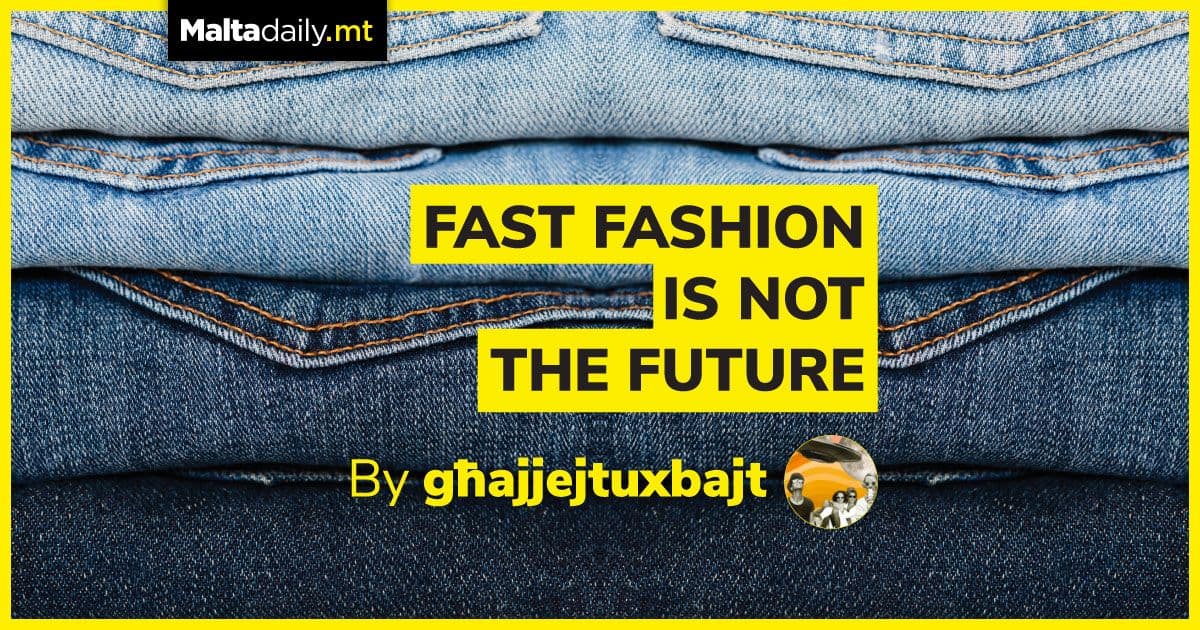Fast fashion is not the future | Għajjejt u Xbajt

After working with Fashion Revolution Malta as a student representative for the past few years, I can never experience a fast fashion outlet in the same way I once did. I still see clothes as a playground for self-expression, each garment a slide into a new identity, or deeper into an existing one. But whereas stepping into one of these shops used to feel like creativity, excitement and potential, it’s now just a giant physical symbol of the ‘fast fashion’ system — a business model popularised in the 90s where garment workers, often children and women of colour, are paid as little as possible, to rapidly produce as much clothing as possible.
Whereas the clean white walls used to feel bright and inviting, they now feel like a whitewashing of crowded sweatshops where safety hazards such as factory fires or collapses abound and women are extremely vulnerable to sexual violence. Where I saw endless potential in new collections every week, design after design on the shop floor, (there’s always another level if you didn’t find anything you liked on the previous one) I now see the sheer amount of overproduction and waste generated. High quotas of garments to fulfil per hour for less than a living wage means that workers are exhausted yet trapped in the cycle of poverty, and the reality of union- busting is that they are stripped of the fundamental right to negotiate their conditions.
This is the system which allows for global fashion brands to pollute our ecosystems with 100 billion new items of clothing per year. Not only is production extremely resource-intensive, but the reality of cheap, poor-quality clothing is that it normalises a throwaway culture. One where overconsuming clothes is an affordable thing to do for fun for people in the global North, and dealing with our clothing waste is a burden people don’t have the privilege to ignore in the global South. The OR foundation, a charity working to catalyse a justice-led circular economy highlights this reality in Ghana, where our clothing waste currently sits on Accra’s beaches and burns in open dumpsites where cattle graze and children play.
Though I came to the movement after watching the documentary ‘The True Cost’ in 2018, it wasn’t until the pandemic hit that I truly began to understand fast fashion as a deeply complex, systemic issue. When lockdowns became a reality and global fashion brands cancelled orders on a mass scale, they refused to pay garment workers $40 billion worth of wages for work which had already been completed. Tahmina Azad, a machine operator in Dhaka, Bangladesh explained in an article for the Guardian how after having nothing to cook for her children for two straight days, she contemplated killing herself and her children, ‘setting them free from this torture’.
When you learn that garment workers are racking up debt in order to fend off starvation during the pandemic, while fashion CEOs hoard billions of dollars in profits, you realise there is something seriously wrong with the current system. It doesn’t get clearer than that. This system may be normalised but it is far from normal. The irony is that sustainability in fashion is now being marketed as a ‘new’ phenomenon defined by recycling technologies, but true sustainability — slower fashion cycles, repairing your clothes and investing in quality clothing was the norm long before fast fashion ever existed. It is a fairly new model which emerged as we know it today in the early 90s and the sad reality is that there is an entire generation of teenagers and young adults who see rapid trend cycles and valuing clothing as disposable as the norm.
This is in no way intended to shame people for consuming fast fashion, but rather to highlight the reality of the system, which continues to paint over exploitation within supply chains with opaque, greenwashing brushstrokes. Fast fashion is not upheld by low-income consumers who buy clothes out of necessity or people who don’t have access to any alternatives.
If you’re interested in the movement but not sure where to start, check out the work of global fashion activism movements such as Fashion Revolution, Remake and The OR foundation, get involved locally with Fashion Revolution Malta, and practice conscious consumption. Retrain yourself to see the value in your clothes, rewear, repair and practice borrowing or swapping with friends or family if this is available to you. Reframing purchases as a long-term commitment can also help encourage you to buy less and take care of what you do buy!
#MaltaDaily #GħajjejtUXbajt


